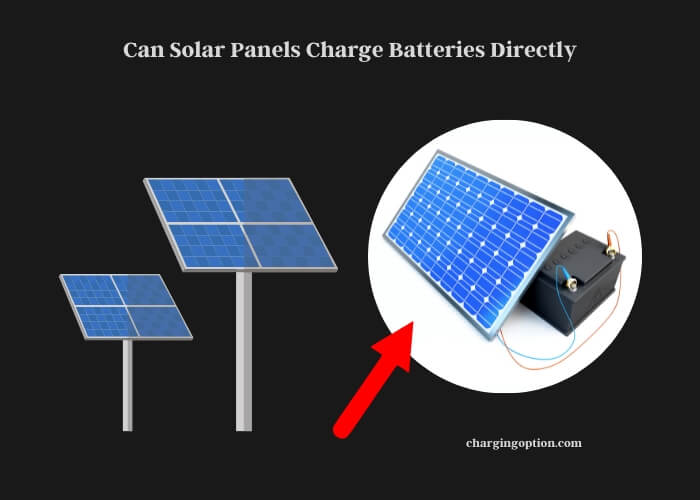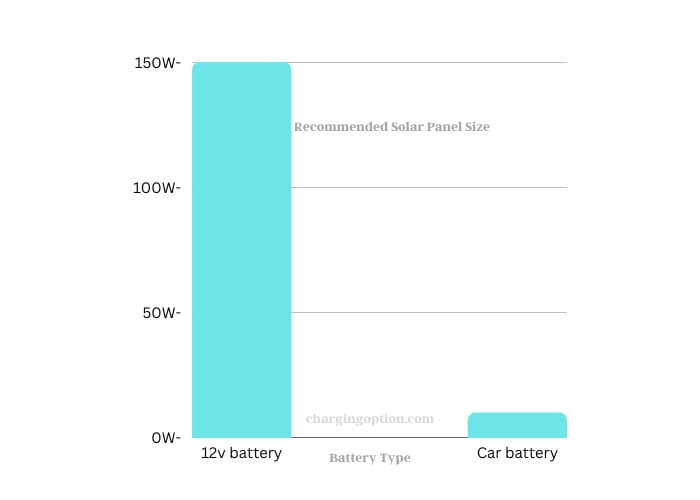Yes, a solar panel can charge a battery directly. However, this method might not be the most efficient or safe way to achieve optimal battery performance.
Solar panels can directly connect to batteries through positive and negative terminals. Nonetheless, this straightforward connection doesn’t always ensure the best outcome for the battery’s longevity or the solar panel’s efficiency. One of the primary concerns is the absence of a diode, which can prevent the reverse flow of current, potentially causing the stored energy in the battery to flow back into the solar panel during periods of low sunlight.

A solar charge controller acts as a mediator between the solar panel and the battery. Its main role is to regulate the voltage and current supplied to the batteries, preventing overcharging, and ensuring safety. Charging a battery without a controller risks damaging the battery from potential overcharge or even causing hazardous conditions.
Considering the size of the solar panel for charging is also essential. For instance, a 12v battery requires a certain panel size for optimal charging. On the other hand, keeping a car battery charged might necessitate a different size.
Another aspect to consider is the potential use of an inverter. While solar panels can charge batteries directly, using an inverter can convert this energy to power household appliances. Beyond solar charging, batteries can also be recharged using traditional electricity or specific battery chargers.
Incorporating these elements ensures the efficient and safe use of solar energy. If you’re intrigued by the nuances and details of this process, we invite you to continue reading the detailed article below.
Can Solar Panel Directly Charge Battery? Find the Truth
The Basics of Solar Energy and Battery Storage
Ever stopped to think how those big shiny panels on rooftops catch sunlight and transform it into energy? In essence, solar panels capture sunlight and convert it into electricity through a process called photovoltaic effect. Now, where does all this energy go? That’s where battery storage comes in. These batteries store the energy for future use. So, if the sun’s taking a break behind clouds or it’s night time, the stored energy can keep the lights on.
Direct Charging: How it Works
Alright, let’s jump right in. So, can solar panels directly charge batteries? Yep, they can. Imagine having two boxes, one with candy and the other empty. If you wanted to transfer the candy, you’d probably just pour it in, right? In the same way, by simply connecting the positive and negative terminals of a solar panel to a battery, electricity flows. But here’s the catch: without something called a diode, your stored energy might just sneak its way back to the solar panel. Kind of like the candy mysteriously jumping back to its original box.
The Need for Solar Charge Controllers
Think of a solar charge controller as a bouncer at a club. It decides who gets in and who stays out. A solar charge controller basically regulates how much energy flows from the solar panel to the battery. Why do we need it? Well, batteries don’t really like being overfed. Overcharging them can reduce their lifespan and even pose safety risks. So, the controller ensures the battery gets just the right amount of energy.
Solar Panel Sizes: Making the Right Choice
Ever tried fitting into a pair of jeans from your teenage years? Not all sizes fit all occasions. Similarly, not all solar panels fit all battery types. You’ve got to pick the right size to make the magic happen.
| Battery Type | Recommended Solar Panel Size |
| 12v battery | 150W-300W |
| Car battery | 10W-20W |

So, if you’re thinking of keeping your car battery charged, a smaller panel would do the trick. But for a 12v battery at home, you’d need something with more power.
The Role of Inverters in Solar Charging
Imagine you’re traveling abroad. Your phone’s charger plug doesn’t match the socket in the hotel room. Frustrating, right? That’s where adapters come in. Similarly, in the world of solar energy, inverters are our adapters. They change the type of electricity from what solar panels produce to what our home appliances use. So, while solar panels can directly charge batteries, if you want to run your home appliances smoothly, an inverter is your best friend.
Beyond Solar: Other Battery Charging Methods
Solar’s cool, but what if you want to juice up your solar batteries using good old electricity? Or maybe through a different charger? Well, you absolutely can. Plugging them into an electric source or using specific solar battery chargers are both viable methods. Think of it like having both a microwave and an oven. Different tools, but both get the job done.
Risks and Drawbacks of Direct Charging
Not to be a buzzkill, but there are a few things to watch out for if you’re going the direct charging route. Without the right equipment, you might end up damaging your precious solar panel or battery. It’s kind of like trying to fill a water balloon. Too much pressure and…pop! Similarly, pushing too much electricity into a battery can spell disaster.
Sustainable Charging: Tips for Optimal Efficiency
Want to make the most of your solar setup? Sure you do! Ensuring the longevity of both your solar panel and battery is crucial. Here are some tips to keep things running smoothly.
| Efficiency Tips | Why It Matters |
| Monitor battery health regularly | Avoids overcharging and damage |
| Ensure connections are clean and secure | Prevents energy loss |
| Use solar panels and batteries of compatible sizes | Maximizes energy conversion |
Remember, solar energy is like a goldmine of sustainable power. But just like mining, you’ve got to have the right tools and techniques to get the most out of it.
Summary
Direct charging of batteries through solar panels is totally doable. But with great power comes great responsibility. Ensuring that you’re equipped with the right tools and knowledge can make your transition to solar energy smooth and efficient. Ready to harness the power of the sun? Let’s light up the world, one panel at a time!
FAQs on Solar Panels and Battery Charging
Can You Directly Charge a 12 Volt Battery with Solar Panels?
Yes, you can directly charge a 12-volt battery with solar panels. However, the number of panels required depends on the wattage of the panels and the energy needs of the battery.
How Many Watts Are Needed from a Solar Panel to Charge a 12V Battery?
Typically, a 12V battery requires a solar panel ranging from 150W to 300W for efficient charging. This can vary based on the battery’s capacity and the sun’s intensity.
Is it Important to Consider the Distance between Solar Panels and Inverters when Charging Batteries Directly from Solar Panels?
When charging batteries directly from solar panels, efficient solar panel placement is crucial. The distance between the solar panels and inverters significantly impacts the overall performance. A shorter distance minimizes energy loss and ensures optimal charging efficiency. Therefore, considering the distance between them is essential for optimizing the charging process and maximizing the benefits of solar power.
What Size Solar Panel Is Suitable for Charging a Car Battery?
For charging a car battery, a solar panel size between 10W to 20W is generally sufficient, ensuring a steady trickle charge to maintain battery health.
Why Would You Charge a Solar Battery with Electricity?
Charging a solar battery with electricity can be an alternative when there’s insufficient sunlight, ensuring continuous power availability during prolonged cloudy days or at nighttime.
How Do Solar Panels Function in Charging Batteries?
Solar panels capture sunlight and convert it into electricity. This electricity is then channeled to the batteries, where it’s stored for future use, either directly or through charge controllers.
Is There a Specific Controller Needed for Solar Battery Charging?
Yes, a solar charge controller is often recommended. It regulates the flow of electricity from the solar panel to the battery, ensuring the battery doesn’t overcharge and maintains its health and efficiency.
What Size Solar Panel Is Best for Maintaining a 12V Battery?
To maintain a 12V battery, solar panels with a capacity ranging from 10W to 50W are ideal. This ensures the battery is kept at a full charge without overloading it.
You May Also Like:
- Promariner Battery Charger Problems: A Complete Analysis
- Troubleshooting Hme Solar Power Panel Not Charging
- Troubleshooting Bird Buddy Solar Roof Not Charging: A Detailed Guide
- How to Charge Solar Lights with On/Off Switch: A Complete Guide
- Fixing Issues with American Farmworks Solar Fence Charger: A Complete Guide
Additional Resources:
